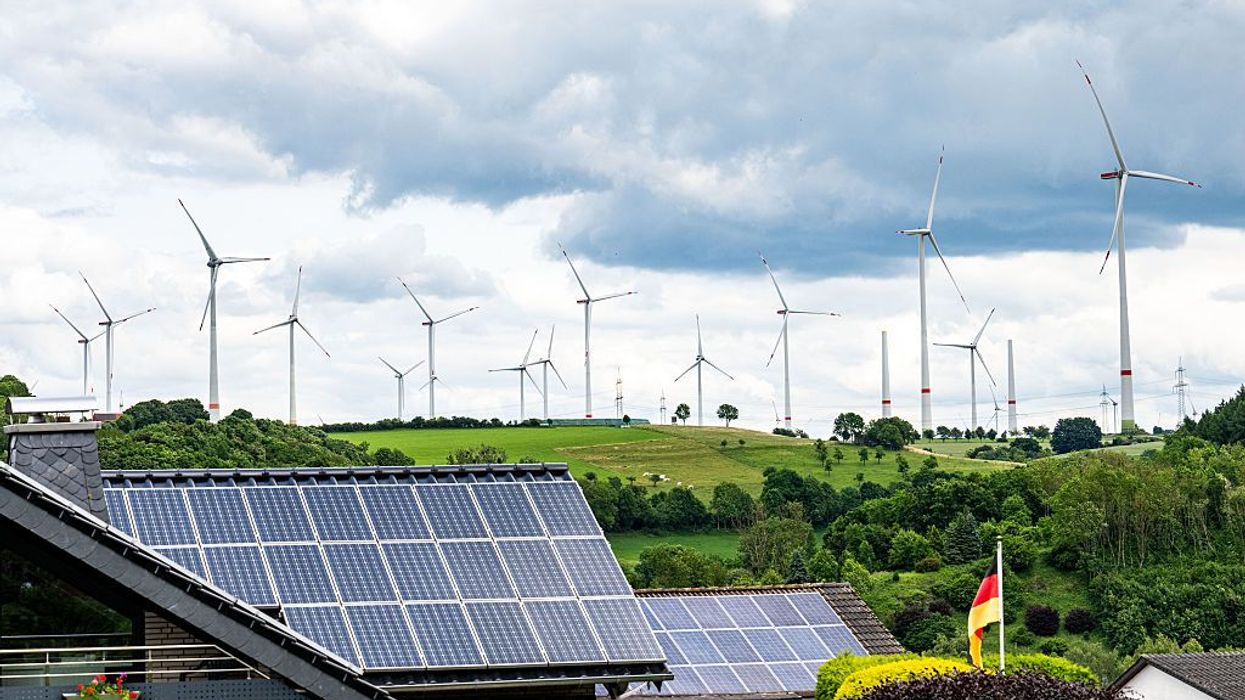April, 15 2009, 03:27pm EDT

For Immediate Release
Contact:
Lisa Nurnberger, Media Director, lnurnberger@ucs.org
Polluters Could Fund Clean Energy Projects
State Rep. Nekritz, Coalition of Faith, Tax and Science Groups Say Climate Legislation Could Fund Clean Energy Projects, Fill State Budget Gap
WASHINGTON
Illinois residents filing personal income taxes today may face
future tax increases as the state tries to balance its budget. But
Illinois State Rep. Elaine Nekritz (D-Northbrook) and a coalition of
scientific, faith and tax organizations today offered another approach:
raise revenue by making companies pay to pollute.
"The Climate Action and Clean Energy Investment Act would address
one of the most pressing problems our society faces," said Rep.
Nekritz. "Requiring polluters to pay would have the added benefit of
helping our state get back in the black."
Nekritz's bill (H.B. 3668) would limit heat-trapping emissions from
large polluting sources, such as power plants and oil refineries.
Companies could buy emissions credits-each worth a ton of
emissions-through a state-run auction. They would have the flexibility
to choose the best mix of reducing emissions or buying credits.
"Making polluters pay could prove far more popular-and
lucrative-than increasing taxes," said Ron Burke, Midwest office
director at the Union of Concerned Scientists (UCS). A UCS analysis
calculates that the Nekritz bill could raise $800 million to $4 billion
annually in Illinois.
By comparison, the proposed $.08 per gallon gas tax increase
sponsored by Illinois House Speaker Michael Madigan (D-Chicago) would
generate approximately $500 million a year, while Gov. Pat Quinn's
proposed income tax changes would generate slightly more than $3
billion a year.
Revenues raised from polluting businesses would go toward measures
that strengthen energy efficiency, increase renewable energy use,
acquire and preserve natural areas with plants and trees that store
carbon dioxide, and further cut global warming pollution in ways that
generate new local jobs. The state could also use a portion of the
revenue to shore up its budget.
The House climate bill is part of a comprehensive set of climate
policy recommendations sponsored by the Illinois Climate Change
Advisory Group (ICCAG). The Legislature already has passed two new laws
based on the advisory group's recommendations, including renewable
energy standards for utilities and energy efficiency standards for new
commercial buildings.
A 2007 state-commissioned study found that implementing the ICCAG
strategies would reduce global warming emissions to 1990 levels by 2020
and create 60,000 new jobs in 2020. The analysis also found that
statewide energy costs would drop $1.1 billion in 2010, $2.6 billion in
2015, and $3.2 billion in 2020 compared with business as usual.
"Investing in energy efficiency, renewable energy and other
low-carbon technologies will save consumers money and cut global
warming emissions at the same time," said Burke.
Later this spring, Gov. Quinn and governors from five other
Midwestern states are expected to sign off on a regional market-based
program to reduce heat-trapping emissions. The House climate bill is
designed to mesh with this regional program and authorize Illinois
agencies to work with their counterparts in other Midwestern states and
elsewhere.
At the federal level, Congress is expected to enact national global
warming legislation sooner rather than later, Burke pointed out. By
establishing a climate program before Congress acts, UCS maintains that
Illinois would be better positioned to cut emissions and generate
revenue that might otherwise have to come from tax increases.
Fears that such a program would push businesses-and jobs-out of state are unfounded, said Burke.
"With federal climate legislation on the horizon, polluters have
nowhere to hide. Our state should seize the opportunity now to get
ahead of the curve."
Finally, Illinois has a responsibility to address the problem it
helped cause, Burke said. If Illinois were a nation, it would rank as
the world's 24th largest global warming polluter.
"Illinois has a lot to lose if global warming continues unchecked,
including reduced agricultural output, more urban heat waves, heavier
rains, and increased flooding in the coming decades," he said.
"Enacting climate legislation would put our economy and our environment
on the right path."
The Union of Concerned Scientists is the leading science-based nonprofit working for a healthy environment and a safer world. UCS combines independent scientific research and citizen action to develop innovative, practical solutions and to secure responsible changes in government policy, corporate practices, and consumer choices.
LATEST NEWS
Military Budget Bill Would Ramp Up Israel Aid to Fill In 'Gaps' When Other Countries Impose Embargoes Over Genocide
The House Armed Services Committee said in September that the measure "combats antisemitism."
Dec 09, 2025
A little-reported provision of the latest military spending bill would direct the US to create a plan to fill the "gaps" for Israel whenever other nations cut off arms shipments in response to its acts of genocide in Gaza.
As Prem Thakker reported Monday for Zeteo, the measure is "buried" more than 1,000 pages into the more than 3,000-page National Defense Authorization Act (NDAA), which is considered by lawmakers to be “must-pass" legislation and contains a record $901 billion in total spending.
Republicans are shepherding the bill through the US House of Representatives, where—as is the case with most NDAAs—it is expected to pass on Wednesday with Democratic support, even as some conservative budget hardliners refuse to back it, primarily over its $400 million in military assistance to Ukraine.
Since the genocide began following Hamas' attack on October 7, 2023, the US has provided more than $21.7 billion to Israel, including hundreds of millions that have been supplied through NDAAs.
The new NDAA includes at least another $650 million to Israel, an increase of $45 million from the previous one, even though this is the first such bill to be introduced since the "ceasefire" that went into effect in October. This aid from the Pentagon comes on top of the $3.3 billion already provided through the State Department budget.
But this NDAA also contains an unprecedented measure. It calls for the “continual assessment of [the] impact of international state arms embargoes on Israel and actions to address defense capability gaps."
The NDAA directs Secretary of Defense Pete Hegseth, Secretary of State Marco Rubio, and Director of National Intelligence Tulsi Gabbard to assess “the scope, nature, and impact on Israel’s defense capabilities of current and emerging arms embargoes, sanctions, restrictions, or limitations imposed by foreign countries or by international organizations,” and “the resulting gaps or vulnerabilities in Israel’s security posture.”
As Drop Site News explains, "this means the US would explicitly use federal law to step in and supply weapons to Israel whenever other countries cut off arms to halt Israel’s ongoing violations across the region."
"The point of this assistance, to be clear, is to make up for any identified insufficiencies Israel may have due to other countries' embargoing it as a result of its ongoing genocide in Palestine," Thakker wrote.
A similar provision appeared in a September version of the NDAA, which the House Armed Services Committee praised because it supposedly “combats antisemitism"—explicitly conflating a bias against Jewish people with weapons embargoes that countries have imposed to stop Israel from continuing its routine, documented human rights violations in Gaza.
Among the nations that have cut off weapons sales to Israel are Japan, Canada, France, Italy, and Spain. Meanwhile, other major backers, such as the United Kingdom and Germany, have imposed partial freezes on certain weaponry.
While official estimates from the Gaza Ministry of Health place the number of dead from Israel's military campaign at over 70,000, with more than 170,000 wounded, an independent assessment last month from the Max Planck Institute for Demographic Research in Germany and the Center for Demographic Studies in Spain found that the death toll “likely exceeds 100,000." This finding mirrored several other studies that have projected the true death toll to be much higher than what official estimates show.
Embargoes against Israel have been called for by a group of experts mandated by the United Nations Human Rights Council, including Francesca Albanese, the UN Special Rapporteur on the occupied Palestinian territories. Meanwhile, numerous human rights organizations, including the leading Israeli group B’Tselem, have said Israel’s campaign in Gaza has amounted to genocide.
Keep ReadingShow Less
‘Who Will Be in Charge?’ Sanders Warns of AI Future Dominated by Handful of Billionaires
"Are we comfortable with seeing these enormously wealthy and powerful men shape the future of humanity without any democratic input or oversight?" asked Sen. Bernie Sanders.
Dec 09, 2025
US Sen. Bernie Sanders said Monday that policymakers in the United States and around the world are at a critical juncture where they must decide whether artificial intelligence will be controlled and exploited by the ultra-wealthy—or utilized for the benefit of all humanity.
In a speech on the floor of the US Senate, Sanders (I-Vt.) said the key question is, "Who will be in charge of the transformation into an AI world?"
"Currently, a handful of the wealthiest people on Earth—people like Elon Musk, Jeff Bezos, Bill Gates, Mark Zuckerberg, Peter Thiel, and others—and others are investing many, many hundreds of billions of dollars in developing and implementing AI and robotics," the senator said. "Are we comfortable with seeing these enormously wealthy and powerful men shape the future of humanity without any democratic input or oversight?"
Watch the full speech:
Sanders noted that US President Donald Trump "is strongly supporting" billionaire dominance of burgeoning AI technology, including with his plan to sign an executive order aimed at blocking state-level regulations of the artificial intelligence industry.
"Does this elite group of some of the most powerful people on Earth believe that they have the divine right to rule?" the senator asked.
Sanders also emphasized the potentially catastrophic impact of AI technology on workers, as Amazon and other corporate giants seek to replace as many jobs as possible with robots. In October, Sanders released a report estimating that advances in AI technology could supplant nearly 100 million US jobs over the next decade, including 89% of fast food workers and 40% of registered nurses.
"If AI and robotics eliminate millions of jobs and create massive unemployment, how will people survive if they have no income? How do they feed their families, pay for housing, pay for healthcare?" Sanders asked. "That might be an issue that we should be talking about, like, yesterday."
In recent weeks, Sanders has made burgeoning AI technology and its concentration in the hands of a few powerful individuals and corporations a major focus, holding an event with computer scientist Geoffrey Hinton—who is known as the "godfather of AI"—and warning about the promise and peril of artificial intelligence in the pages of major newspapers.
"AI and robotics are revolutionary technologies that will bring about an unprecedented transformation of society," Sanders wrote in a Guardian column last week. "Will these changes be positive and improve life for ordinary Americans? Or will they be disastrous? Congress must act now."
Keep ReadingShow Less
UN Report Estimates Bold Climate Action Would Deliver $100 Trillion in Benefits by 2100
"If we choose to stay on the current path—powering our economies with fossil fuels, extracting virgin resources, destroying nature, polluting the environment—the damages would stack up."
Dec 09, 2025
A new report from the United Nations Environment Program has found that addressing the global climate emergency would deliver major economic benefits, in addition to creating a cleaner and more habitable planet.
The seventh edition of the Global Environmental Outlook (GEO), released on Tuesday, estimates that making up-front investments in climate action now would begin to yield global macroeconomic benefits starting in 2050, potentially growing to $20 trillion per year by 2070 and $100 trillion by 2100.
The report, which was the product of nearly 300 multi-disciplinary scientists across more than 80 countries, argues that a total of $8 trillion in annual investment from this year until 2050 would be needed to achieve its climate goals. But, the report stresses, the cost of inaction would be far greater.
"If we choose to stay on the current path—powering our economies with fossil fuels, extracting virgin resources, destroying nature, polluting the environment—the damages would stack up," the report warns. "Climate change would cut 4% off annual global GDP by 2050, claim many lives, and increase forced migration."
Other likely consequences of inaction, warns the report, include "Amazon forest dieback and ice-sheet collapse," along with the loss of "hundreds of millions more hectares of natural lands." The report also projects that global food availability will fall if the climate crisis is not addressed, and that increased air pollution will cause an additional 4 million premature deaths per year.
The report recommends a rapid move away from fossil fuels, as well as a drastic rethinking of agricultural subsidies so that they no longer "directly favor activities that have significant harmful effects on the environment, including on biodiversity."
Robert Watson, a co-chair of the GEO assessment, said in an interview with the Guardian that the climate crisis cannot simply be seen as an environmental issue given that it is now "undermining our economy, food security, water security, human health," and also creating national security problems by increasing "conflict in many parts of the world."
In an interview with BBC, Watson also accused US President Donald Trump's administration of sabotaging the report by refusing to even accept its conclusions about the damage being done by human-induced climate change.
"The US decided not to attend the meeting at all," he explained. "At the very end they joined by teleconference and basically made a statement that they could not agree with most of the report, which means they didn't agree with anything we said on climate change, biodiversity, fossil fuels, plastics, and subsidies."
Keep ReadingShow Less
Most Popular


